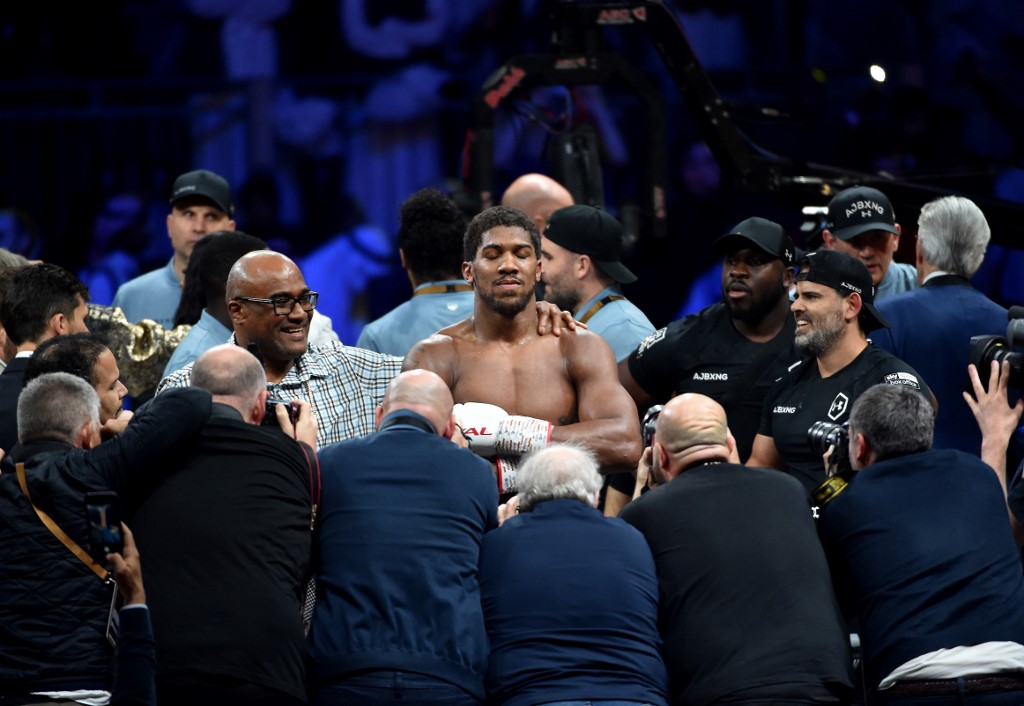
(FILES) In this file photo taken on December 08, 2019 British boxer Anthony Joshua celebrates after winning the heavyweight boxing match between Andy Ruiz Jr. and Anthony Joshua for the IBF, WBA, WBO and IBO titles in Diriya, near the Saudi capital. (Photo by Fayez Nureldine / AFP)
Saudi Arabia’s hosting of the Dakar Rally this month is just the latest international sporting event to take place in the kingdom as part of a multi-billion-dollar push to boost its battered global image.
In recent months the ultra-conservative kingdom — under fire over human rights abuses — has accelerated investment in sports, mirroring a longstanding strategy adopted by regional powers, the United Arab Emirates and Qatar.
Saudi Arabia is seeking to use glitzy sporting extravaganzas as an instrument of soft power in its push for regional supremacy as well as to project a moderate image of a country long seen as an exporter of jihadist ideology.
In 2019 the kingdom hosted a heavyweight boxing rematch between Anthony Joshua and Andy Ruiz, a Formula E motor race and a tennis exhibition tournament.
Women’s wrestling, somewhat toned down from its usual razzmatazz, also made its debut in a nation where such events were once unthinkable.
In December, Cristiano Ronaldo and his Juventus teammates took to the pitch at the King Saud University Stadium in Riyadh for the Italian Super Cup.
And in January, a Barcelona side featuring Lionel Messi will appear in the Spanish Super Cup, two months after the Argentine superstar played his first match on Saudi soil in a friendly encounter against Brazil.
But one of the biggest events is the coveted Dakar Rally, one of motor racing’s most grueling adventure rallies which starts in the kingdom on Sunday and lasts until January 17.
After more than a decade in South America, the rally is set to remain in the Arabian peninsula for at least five years.
– ‘Sports diplomacy’ –
De facto ruler Crown Prince Mohammed bin Salman’s sports push stems partly from an economic motive to lure international tourists and boost domestic spending as the OPEC kingpin seeks to diversify its oil-reliant economy.
But in a country where two-thirds of the population is under 30, critics say glitzy sporting events are aimed at blunting public frustration over an economic downturn and soaring youth unemployment.
Activists also accuse Saudi rulers of “sportswashing”, using such events as a tool to soften their international image after long being condemned over human rights abuses.
The brutal murder of journalist Jamal Khashoggi in Istanbul in 2018, the Saudi-led military intervention in Yemen and a sweeping crackdown on dissent have tarnished the kingdom’s reputation.
Saudi Arabia executed at least 187 people on death row in 2019, according to a tally based on official data, the highest since 1995 when 195 people were executed.
And while Saudi women now have the right to drive, campaigners say jailed driving activists have faced sexual harassment and torture in detention.
“There is a very offensive policy to host major sporting events… to spread a different image of Saudi Arabia,” Carole Gomez, a researcher at the Institute of International and Strategic Relations, told AFP.
The kingdom is using “sports diplomacy” as part of Prince Mohammed’s Vision 2030 reform program to diversify its economy, Gomez added.
Saudi officials expect events such as the Dakar Rally will help boost tourism, one of the centerpieces of Vision 2030.
Saudi Arabia began offering tourist visas for the first time last September.
‘Postcard’
The Dakar Rally, to be broadcast in 190 countries, will pass through a host of sites –- from NEOM, a $500 billion futuristic megacity under construction, to the heritage site of Al-Ula and the sand dunes of the vast Empty Quarter desert.
“The idea is to praise the beauty of the landscapes, the infrastructures… and to make a postcard of Saudi Arabia,” said Gomez.
Quentin de Pimodan, an expert on the Sunni kingdom at the Research Institute for European and American Studies, said the rally “will serve Saudi Arabia the same way Tour de France serves France”.
“It will showcase the landscapes and the heritage — the long shots and wide angles — as the kingdom opens up to international tourists,” he said.
However, accusations of “sportswashing” have prompted some international players to shun the kingdom.
Golf superstars Tiger Woods and Rory McIlroy recently declined a lucrative invitation to take part in a tournament organized in Saudi Arabia.
McIlroy, who was reportedly offered $2.5 million, hinted in an interview with Golf Channel that “morality” had influenced his decision.
Saudi Arabia is attempting to “sportswash away its abusive rights reputation using large-scale events, with highly controlled environments,” said Human Rights Watch.
“Fans and viewers need to look past the glamour of these events.”
But Dakar Rally organizers have praised Saudi Arabia’s “willingness to open up” amid unprecedented social reforms after years of conservatism.
Gomez said the response to the rally could help determine the impact of its sports push.
“It will be interesting to see how the event plays out, how it is experienced, what the repercussions are and what happens afterwards,” said Gomez.

